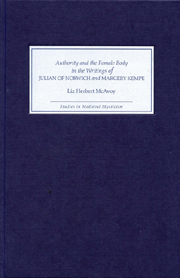Book contents
- Frontmatter
- Contents
- Dedication
- Acknowledgements
- Abbreviations
- Introduction
- 1 Motherhood and Margery Kempe
- 2 The Motherhood Matrix in the Writing of Julian of Norwich
- 3 Discourses of Prostitution and The Book of Margery Kempe
- 4 ‘3yf thowe be payede,’ quod oure lorde, ‘I am payede’: Hermeneutics of the Holy Whore in Julian of Norwich
- 5 Margery Kempe: Wisdom, Authority and the Female Utterance
- 6 Julian of Norwich: Voice of the Wise Woman
- Afterword
- Bibliography
- Index
Afterword
Published online by Cambridge University Press: 12 September 2012
- Frontmatter
- Contents
- Dedication
- Acknowledgements
- Abbreviations
- Introduction
- 1 Motherhood and Margery Kempe
- 2 The Motherhood Matrix in the Writing of Julian of Norwich
- 3 Discourses of Prostitution and The Book of Margery Kempe
- 4 ‘3yf thowe be payede,’ quod oure lorde, ‘I am payede’: Hermeneutics of the Holy Whore in Julian of Norwich
- 5 Margery Kempe: Wisdom, Authority and the Female Utterance
- 6 Julian of Norwich: Voice of the Wise Woman
- Afterword
- Bibliography
- Index
Summary
‘Make now tablets of stone and other tablets of clay and write in them all my life and your father's which you have heard and seen from us.’
So speaks Eve to her many children from the lonely heights of her deathbed. According to an apocryphal tradition which records the post-Edenic life of Adam, Eve and their offspring, on Adam's death and prior to her own demise Eve instructs her son, Seth, to set down their lives in tablets of clay and stone in order to make permanent for posterity their transgression and suffering. Although he knows no writing, following his mother's death Seth's hand is guided by God as he writes the lives of the first mother and father into clay and stone, becoming essentially the first scribe.
Within orthodox Judaeo-Christian tradition, of course, this inauguration of writing was regarded as a patrilineal inheritance, with figures such as Moses, Enoch, or sometimes even Adam himself as the originator of the written script. Within the alternative tradition, however, to be found in the apocryphal Adam Books, Eve herself is quite explicitly depicted as the originator of writing, in keeping with the written word's later association with the fleshly, seductive nature of women. The Latin version of this legend, known as the Vita, seems to have enjoyed widespread influence and popularity throughout the Middle Ages, as evidenced in a number of popular texts, ranging from the Townely and Chester Cycle plays to the continenental Genesis B, and later even re-emerging in the early modern period in Milton's epic, Paradise Lost.
- Type
- Chapter
- Information
- Authority and the Female Body in the Writings of Julian of Norwich and Margery Kempe , pp. 235 - 237Publisher: Boydell & BrewerPrint publication year: 2004



